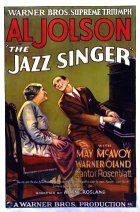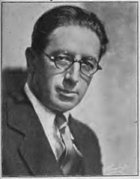
The Jazz Singer Page #7
- UNRATED
- Year:
- 1927
- 88 min
- 1,255 Views
Jakie is just finishing a song and those at the tables start applauding.
Some of them throw coins to Jakie.
68.CLOSE-UP JAKIE
His singing manners have gone. Now he is just business as he starts to
pick up the scattered coins. He picks up the last one and pockets it.
Then he turns to the piano player.
69.CLOSE SHOT BOTH
They discuss what Jakie is to sing next. Then the piano player starts a
ragtime piece and Jakie starts to sing in the most approved darkey
manner.
70.FULL SHOT GARDEN
The people at the tables are showing new interest in the singer.
The door opens suddenly and the figure of the irate cantor appears. He
pauses and takes one look, then strides in with great determination.
He is putting everything he has into his song. He is rolling his eyes
and calling on "his baby." His eyes drop and he looks forward just in
time to see his father coming toward him. His voice breaks as the old
man comes into the scene. A determined arm reaches up and grabs him, and
the song ends abruptly.
73.FULL SHOT ROOM
With the boy in a viselike grip, the cantor starts toward the door with
the squirming figure of his young son. The people at the table are
laughing heartily at the unexpected entertainment. Father and son exit.
74.CLOSE-UP PIANO PLAYER
Getting the humor of the situation, he starts playing something
appropriate, like "Stay in Your Own Backyard" or perhaps something more
modern and more to the point.
75.RABINOWITZ LIVING ROOM
Sara is sitting in the rocking chair, rocking slowly back and forth,
occasionally dabbing at her eyes with a handkerchief. She gets up and
goes to the table. She feels one of the dishes and, seeing that it is
cold, she starts with it to the kitchen. As she returns she looks toward
the front door, then rushes hurriedly in that direction.
The cantor comes in breathlessly, pushing the boy ahead of him, just as
Sara comes up to them. The boy tries to go to her but the irate cantor
holds him tightly and motions Sara not to interfere.
77.CLOSE SHOT GROUP
The cantor glares down at the boy who starts squirming. He tightens his
grip on him as he repeats over and over: "Singing n*gger songs in a beer
garden! You bummer! You no good lowlife!" As Sara tries to intercede,
the cantor silences her almost roughly. As he half pushes her away he
says:
TITLE 21:
"I will teach him he shall never again use hisvoice for such low things."
Translation
Translate and read this script in other languages:
Select another language:
- - Select -
- 简体中文 (Chinese - Simplified)
- 繁體中文 (Chinese - Traditional)
- Español (Spanish)
- Esperanto (Esperanto)
- 日本語 (Japanese)
- Português (Portuguese)
- Deutsch (German)
- العربية (Arabic)
- Français (French)
- Русский (Russian)
- ಕನ್ನಡ (Kannada)
- 한국어 (Korean)
- עברית (Hebrew)
- Gaeilge (Irish)
- Українська (Ukrainian)
- اردو (Urdu)
- Magyar (Hungarian)
- मानक हिन्दी (Hindi)
- Indonesia (Indonesian)
- Italiano (Italian)
- தமிழ் (Tamil)
- Türkçe (Turkish)
- తెలుగు (Telugu)
- ภาษาไทย (Thai)
- Tiếng Việt (Vietnamese)
- Čeština (Czech)
- Polski (Polish)
- Bahasa Indonesia (Indonesian)
- Românește (Romanian)
- Nederlands (Dutch)
- Ελληνικά (Greek)
- Latinum (Latin)
- Svenska (Swedish)
- Dansk (Danish)
- Suomi (Finnish)
- فارسی (Persian)
- ייִדיש (Yiddish)
- հայերեն (Armenian)
- Norsk (Norwegian)
- English (English)
Citation
Use the citation below to add this screenplay to your bibliography:
Style:MLAChicagoAPA
"The Jazz Singer" Scripts.com. STANDS4 LLC, 2024. Web. 9 Jun 2024. <https://www.scripts.com/script/the_jazz_singer_878>.



Discuss this script with the community:
Report Comment
We're doing our best to make sure our content is useful, accurate and safe.
If by any chance you spot an inappropriate comment while navigating through our website please use this form to let us know, and we'll take care of it shortly.
Attachment
You need to be logged in to favorite.
Log In